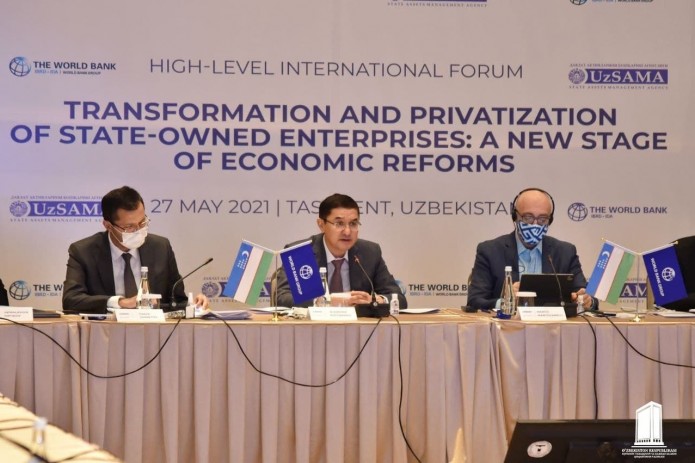Uzbekistan's privatisation process gets a boost as global experts meet in Tashkent
Uzbekistan's privatisation process gets a boost as global experts meet in Tashkent

Uzbekistan’s intention to reduce the number of SOEs by 75% by 2026 will create a strong and competitive private sector, as well as a more inclusive and dynamic economy, World Bank experts said during a forum in Tashkent on May 27. The event was organised by the State Assets Management Agency in partnership with the international bank.
Finance Minister of Uzbekistan, Timur Ishmetov, addressing the event said that the number of SOEs in the country currently stays at around 2,500, with most of them holding their activity in the form of unitary enterprise. He added that their reduction would help to raise additional private investment in various sectors and improve the business environment for vibrant private sector growth.
“Privatization and transformation of state-owned enterprises, as you know, is one of the priority areas for the improvement of best management practices, as well as open, transparent, and market-oriented principles in creating broad opportunities for participation in the process of private capital reforms, reducing the role of the State in the economy and further improving the competitive environment. We have a solid reform agenda that will continue and I can cite as an example the recent visit of Ms. Anna Bjerde to Uzbekistan. Her very successful, warm, and constructive meeting with the esteemed President of the Republic of Uzbekistan, and I think it was shown once again, and she and the entire delegation of the World Bank were once again convinced that the leader of Uzbekistan is committed to reforms”, - said Jamshid Kuchkarov, Deputy Prime Minister of Uzbekistan.
According to Anna Bjerde, the World Bank’s Vice President for Europe and Central Asia, the lessons from foreign countries’ experiences highlight the importance of well-sequenced and transparent privatization and state enterprise reforms.
She said: “SOEs often operate as monopolies, they enjoy unfair advantages of preferential access to land, enjoy preferential regulatory policies. This negatively impacts competition by limiting private sector investment and growth, reducing innovation and the creation of new jobs. In Uzbekistan, 50% of GDP is still derived from state-driven economic activity. The Covid crisis has made a transition to a market economy even more important for Uzbekistan. A primary development challenge in Uzbekistan is the creation of new productive and sustainable jobs. This requires an accelerated transition towards a private sector-driven market-based economy. Uzbekistan’s public sector will not be able to create a large number of jobs required to meet the needs of the young labor force that is expected to continue growing until 2040. Accelerating the reform of SOEs and creating a competitive and inclusive private sector growth model, as stated in Uzbekistan’s 2017-2021 national strategy, is essential”.
“Today’s discussions highlighted cases from Europe and East Asia that emphasize the importance of careful sequencing, prioritization, and transparency in the reform process. They also emphasize the importance of ensuring strong safety nets and labor market interventions to support those who may become displaced by the reform of state-owned enterprises. Looking ahead, the World Bank reaffirms its support to the government of Uzbekistan as it enters this important phase of reforms to expand competitive private sector growth. Along with several other international financial institutions and development partners, we look forward to working closely with the government to implement an effective and transparent privatization process”, noted Marco Mantovanelli, World Bank Country Manager for Uzbekistan.
According to Wieslaw Kaczmarek, Consultant at Uzbekistan’s State Assets Management Agency, privatization is just an instrument to achieve several goals. If the strategic purpose of the country is to strengthen the private entrepreneurs, then privatization is the best tool.
“Let’s consider that if we’d build such a policy in Uzbekistan as in Poland, which presupposes the existence of Uzbek champions. What does it mean? These are industry companies that will be leaders not only in the local market, but also abroad, in various industries, relying on natural resources, personnel, the market, its participation, and other aspects. In addition, the country has to admit, that one of the strategic purposes of the republic is the development of human capital. Uzbekistan may become the hub of all the services for business and entrepreneurship including accounting, logistics, IT, media, and other spheres. To implement all the projects, the young generation require language skills, IT knowledge and so on. Participation in the privatization process is risky”, - he said.





.jpg)
.png)
















